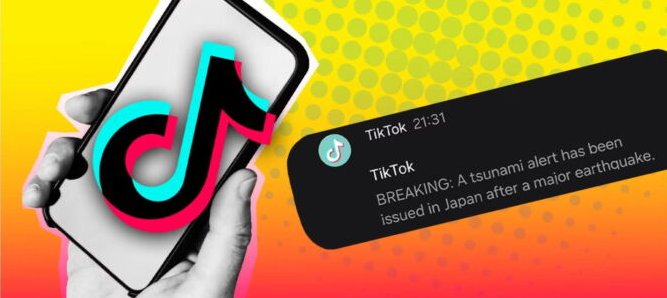News-style notifications include false claims about Taylor Swift, other misleading info.

TikTok has been sending inaccurate and misleading news-style alerts to users’ phones, including a false claim about Taylor Swift and a weeks-old disaster warning, intensifying fears about the spread of misinformation on the popular video-sharing platform.
Among alerts seen by the Financial Times was a warning about a tsunami in Japan, labeled “BREAKING,” that was posted in late January, three weeks after an earthquake had struck.
Other notifications falsely stated that “Taylor Swift Canceled All Tour Dates in What She Called ‘Racist Florida’” and highlighted a five-year “ban” for a US baseball player that originated as an April Fool’s day prank.
The notifications, which sometimes contain summaries from user-generated posts, pop up on screen in the style of a news alert. Researchers say that format, adopted widely to boost engagement through personalized video recommendations, may make users less critical of the veracity of the content and open them up to misinformation.
“Notifications have this additional stamp of authority,” said Laura Edelson, a researcher at Northeastern University, in Boston. “When you get a notification about something, it’s often assumed to be something that has been curated by the platform and not just a random thing from your feed.”
Social media groups such as TikTok, X, and Meta are facing greater scrutiny to police their platforms, particularly in a year of major national elections, including November’s vote in the US. The rise of artificial intelligence adds to the pressure given that the fast-evolving technology makes it quicker and easier to spread misinformation, including through synthetic media, known as deepfakes.
TikTok, which has more than 1 billion global users, has repeatedly promised to step up its efforts to counter misinformation in response to pressure from governments around the world, including the UK and EU. In May, the video-sharing platform committed to becoming the first major social media network to label some AI-generated content automatically.
The false claim about Swift canceling her tour in Florida, which also circulated on X, mirrored an article published in May in the satirical newspaper The Dunning-Kruger Times, although this article was not linked or directly referred to in the TikTok post.
Ars Video
How Lighting Design In The Callisto Protocol Elevates The Horror
At least 20 people said on a comment thread that they had clicked on the notification and were directed to a video on TikTok repeating the claim, even though they did not follow the account. At least one person in the thread said they initially thought the notification “was a news article.”
Swift is still scheduled to perform three concerts in Miami in October and has not publicly called Florida “racist.”
Another push notification inaccurately stated that a Japanese pitcher who plays for the Los Angeles Dodgers faced a ban from Major League Baseball: “Shohei Ohtani has been BANNED from the MLB for 5 years following his gambling investigation… ”
The words directly matched the description of a post uploaded as an April Fools’ day prank. Tens of commenters on the original video, however, reported receiving alerts in mid-April. Several said they had initially believed it before they checked other sources.
Users have also reported notifications that appeared to contain news updates but were generated weeks after the event.
One user received an alert on January 23 that read: “BREAKING: A tsunami alert has been issued in Japan after a major earthquake.” The notification appeared to refer to a natural disaster warning issued more than three weeks earlier after an earthquake struck Japan’s Noto peninsula on New Year’s Day.
TikTok said it had removed the specific notifications flagged by the FT.
The alerts appear automatically to scrape the descriptions of posts that are receiving, or are likely to receive, high levels of engagement on the viral video app, owned by China’s ByteDance, researchers said. They seem to be tailored to users’ interests, which means that each one is likely to be limited to a small pool of people.
“The way in which those alerts are positioned, it can feel like the platform is speaking directly to [users] and not just a poster,” said Kaitlyn Regehr, an associate professor of digital humanities at University College London.
TikTok declined to reveal how the app determined which videos to promote through notifications, but the sheer volume of personalized content recommendations must be “algorithmically generated,” said Dani Madrid-Morales, co-lead of the University of Sheffield’s Disinformation Research Cluster.
Edelson, who is also co-director of the Cybersecurity for Democracy group, suggested that a responsible push notification algorithm could be weighted towards trusted sources, such as verified publishers or officials. “The question is: Are they choosing a high-traffic thing from an authoritative source?” she said. “Or is this just a high-traffic thing?”
Additional reporting by Hannah Murphy in San Francisco and Cristina Criddle in London.
© 2024 The Financial Times Ltd. All rights reserved. Not to be redistributed, copied, or modified in any way.




